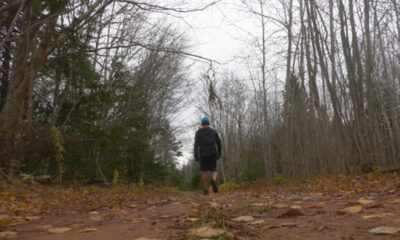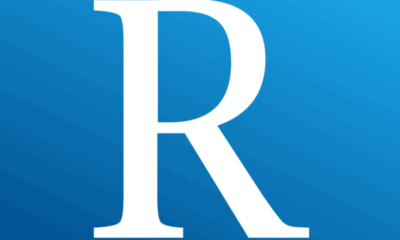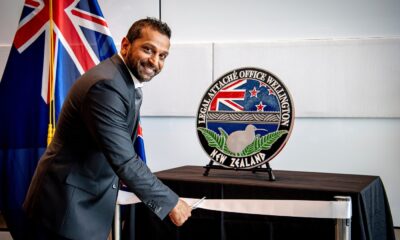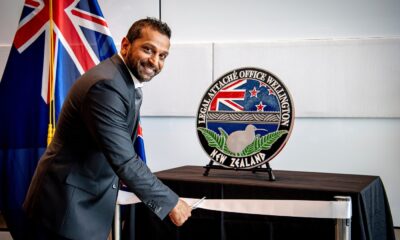Science
Kawaiicon Launches Innovative CO2 Monitoring for Attendees
New Zealand’s Kawaiicon, the country’s leading hacker conference, implemented a pioneering carbon dioxide monitoring system to enhance attendee safety during its event on November 6, 2023. This initiative aims to mitigate the risks associated with “con crud,” a term commonly used to describe illnesses contracted at conventions.
Before the conference commenced, organizers installed a series of DIY carbon dioxide monitors throughout the Michael Fowler Centre, enabling real-time air quality assessments. Attendees could access a public online dashboard displaying CO2 readings for various areas, including session rooms and children’s spaces, prior to their arrival. The organizers humorously noted on the conference website, “It’s ALMOST like we are all nerds in a risk-based industry.”
According to Jeff Moss, founder of the renowned Defcon and Black Hat security conferences, Kawaiicon’s efforts are commendable. He stated, “What they did is fantastic… Kawaiicon building something to do this is the true spirit of hacking.” Elevated CO2 levels can impair cognitive function and increase the risk of airborne virus transmission, making this monitoring a critical health measure.
The conference faced unique challenges, particularly the ongoing threats of COVID-19, measles, and influenza. With public health concerns at the forefront, Kawaiicon organizers recognized the limitations of the Michael Fowler Centre, which operates a single HVAC system equipped with MERV-8 filters—standard for residential environments but inadequate for large gatherings.
To enhance monitoring, Kawaiicon’s planning began a month prior to the event. Organizers deployed 13 RGB Matrix Portal Room CO2 Monitors, a DIY project from Adafruit Industries. These monitors were linked to a live dashboard that displayed real-time data, including daily highs and lows, allowing attendees to make informed decisions about their health and safety.
The initiative was developed in collaboration with researchers from the University of Otago, further validating the project’s scientific foundation. Limor Fried, founder of Adafruit, praised the conference for its innovative adaptation of the Matrix Portal project, emphasizing the importance of understanding air quality in real-world settings.
The Michael Fowler Centre, known for its striking architectural design, presented unique challenges for air quality monitoring. To address this, Kawaiicon strategically placed monitors throughout the venue, including multiple locations in the Main Auditorium and in designated children’s areas. A spokesperson for Kawaiicon explained that effective placement was crucial for ensuring accurate readings.
Throughout the conference, attendees actively monitored CO2 levels via their smartphones, adapting their behavior according to the displayed readings. Each session room featured wall-mounted monitors that used a stoplight color system: green for safe levels, orange for caution, and red for high CO2 levels.
Organizers acknowledged the varied risk tolerances among attendees, stating on their website, “Everyone who occupies the con space we operate has a different risk and threat model.” They encouraged self-assessment and provided a full virtual stream of the conference, ensuring accessibility for all participants.
Kawaiicon’s innovative approach to health and safety stands as a model for future gatherings. The organizers emphasized the importance of personal responsibility, stating, “Just leave others to make the call that is best for them. No one needs your snarky commentary.” This proactive measure not only enhances the comfort of attendees but also contributes to broader public health discussions in the context of ongoing viral outbreaks.
-

 Politics3 weeks ago
Politics3 weeks agoSecwepemc First Nation Seeks Aboriginal Title Over Kamloops Area
-

 World4 months ago
World4 months agoScientists Unearth Ancient Antarctic Ice to Unlock Climate Secrets
-

 Entertainment5 months ago
Entertainment5 months agoTrump and McCormick to Announce $70 Billion Energy Investments
-

 Lifestyle4 months ago
Lifestyle4 months agoTransLink Launches Food Truck Program to Boost Revenue in Vancouver
-

 Science5 months ago
Science5 months agoFour Astronauts Return to Earth After International Space Station Mission
-

 Technology3 months ago
Technology3 months agoApple Notes Enhances Functionality with Markdown Support in macOS 26
-

 Top Stories2 months ago
Top Stories2 months agoUrgent Update: Fatal Crash on Highway 99 Claims Life of Pitt Meadows Man
-

 Lifestyle3 months ago
Lifestyle3 months agoManitoba’s Burger Champion Shines Again Amid Dining Innovations
-

 Sports5 months ago
Sports5 months agoSearch Underway for Missing Hunter Amid Hokkaido Bear Emergency
-

 Politics4 months ago
Politics4 months agoUkrainian Tennis Star Elina Svitolina Faces Death Threats Online
-

 Politics4 months ago
Politics4 months agoCarney Engages First Nations Leaders at Development Law Summit
-

 Technology5 months ago
Technology5 months agoFrosthaven Launches Early Access on July 31, 2025



















